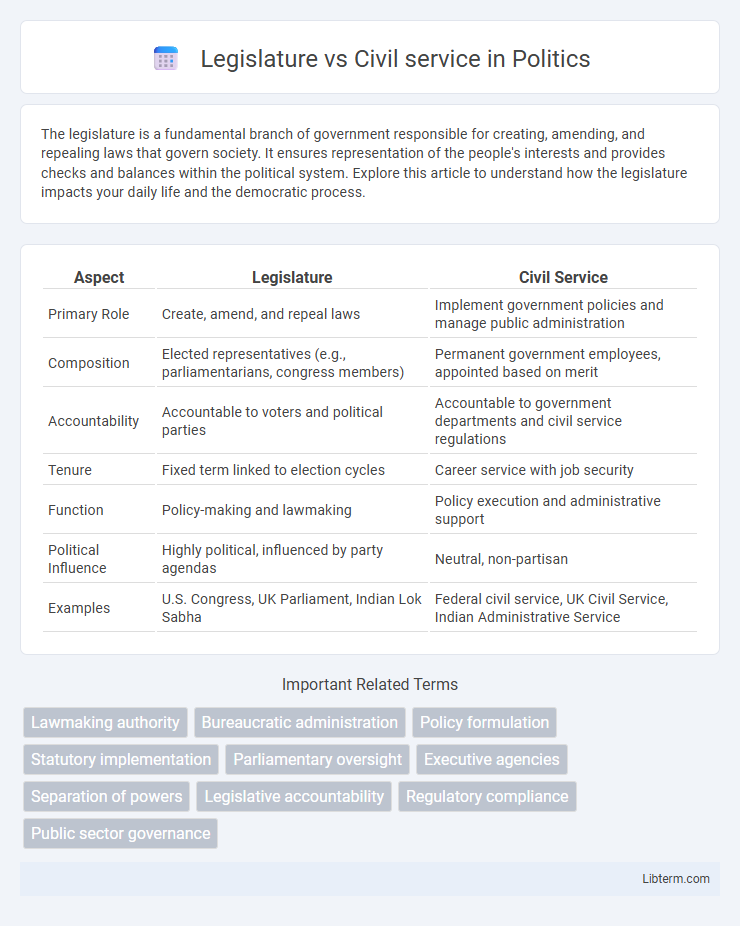The legislature is a fundamental branch of government responsible for creating, amending, and repealing laws that govern society. It ensures representation of the people's interests and provides checks and balances within the political system. Explore this article to understand how the legislature impacts your daily life and the democratic process.
Table of Comparison
| Aspect | Legislature | Civil Service |
|---|---|---|
| Primary Role | Create, amend, and repeal laws | Implement government policies and manage public administration |
| Composition | Elected representatives (e.g., parliamentarians, congress members) | Permanent government employees, appointed based on merit |
| Accountability | Accountable to voters and political parties | Accountable to government departments and civil service regulations |
| Tenure | Fixed term linked to election cycles | Career service with job security |
| Function | Policy-making and lawmaking | Policy execution and administrative support |
| Political Influence | Highly political, influenced by party agendas | Neutral, non-partisan |
| Examples | U.S. Congress, UK Parliament, Indian Lok Sabha | Federal civil service, UK Civil Service, Indian Administrative Service |
Introduction to Legislature and Civil Service
The legislature is a formal government body responsible for creating, amending, and repealing laws, typically composed of elected representatives such as senators or members of parliament. Civil service consists of professional government employees who implement and administer public policies and services, operating under executive agencies rather than elected positions. While the legislature establishes legal frameworks and policies, civil servants ensure the effective execution and management of these laws within various government departments.
Defining the Legislature: Roles and Functions
The legislature is a formal body vested with the authority to enact, amend, and repeal laws, serving as the principal law-making institution in a democratic system. Key functions include representing the electorate, scrutinizing government actions, approving budgets, and overseeing the executive branch to ensure accountability. Unlike the civil service, which implements policies and administers public services, the legislature formulates public policy and establishes the legal framework guiding governance.
Understanding the Civil Service: Structure and Duties
The civil service operates as a professional body within the government, responsible for implementing laws and policies set forth by the legislature. It includes various departments and agencies staffed by career officials who manage public administration and deliver essential services to citizens. The clear distinction between the legislature's role in lawmaking and the civil service's duty in policy execution ensures efficient governance and accountability.
Key Differences Between Legislature and Civil Service
The legislature consists of elected representatives responsible for creating laws and setting public policies, while the civil service comprises career officials who implement these laws and ensure the day-to-day administration of government functions. Legislators have political mandates and engage in policymaking and oversight, whereas civil servants operate under merit-based recruitment and maintain political neutrality to provide continuity and expertise in public administration. The primary distinction lies in the legislature's role as a policy-making body and the civil service's role as an executing agent within the government structure.
Historical Background of Legislature and Civil Service
The historical background of the legislature dates back to ancient societies where councils or assemblies, such as the Roman Senate and the English Parliament, established early forms of representative governance and lawmaking. Civil service originated during the Han Dynasty in China, introducing a merit-based bureaucratic system to administer government functions efficiently. These developments laid the foundation for modern democratic institutions by separating legislative authority from administrative execution through a professional, non-elected workforce.
Recruitment and Appointment Processes
The legislature primarily recruits members through democratic elections where candidates must meet eligibility criteria established by constitutional or electoral laws. In contrast, civil service recruitment is based on meritocratic principles involving competitive examinations, background checks, and adherence to standardized qualifications outlined in public service regulations. Appointment in the legislature depends on voter choice or party nomination, whereas civil service appointments follow formal procedures governed by administrative rules to ensure neutrality and professionalism.
Accountability and Oversight Mechanisms
The legislature holds primary responsibility for creating accountability frameworks and oversight mechanisms to ensure transparency and ethical conduct within the civil service. Civil service accountability is maintained through regular audits, performance evaluations, and compliance with legislative mandates established by elected representatives. Oversight mechanisms include parliamentary committees, public hearings, and reporting requirements that enable the legislature to monitor civil service operations and address inefficiencies or misconduct.
Interactions and Collaboration: Legislature vs Civil Service
The legislature creates laws and sets policy frameworks, while the civil service implements these laws through administrative actions and public services. Effective interactions between the legislature and civil service depend on clear communication channels, policy feedback mechanisms, and accountability measures to ensure laws are enforced as intended. Collaborative oversight committees and inter-agency coordination foster transparency, efficiency, and responsiveness in government operations.
Impact on Governance and Public Policy
The legislature directly shapes governance and public policy by enacting laws, setting budgets, and providing oversight, ensuring democratic accountability and representation. The civil service implements these policies, translating legislative decisions into actionable programs with efficiency and continuity. Effective collaboration between the legislature and civil service enhances policy execution, transparency, and responsiveness to public needs.
Conclusion: Balancing Powers for Effective Administration
Effective administration requires a clear balance between the legislature, which creates laws reflecting democratic mandates, and the civil service, responsible for implementing policies efficiently and impartially. Legislatures set priorities and oversight that guide the civil service's execution of public programs, ensuring accountability and responsiveness to citizen needs. Maintaining this balance fosters transparent governance, reduces bureaucratic overreach, and promotes adaptive policy implementation aligned with legislative intent.
Legislature Infographic

 libterm.com
libterm.com